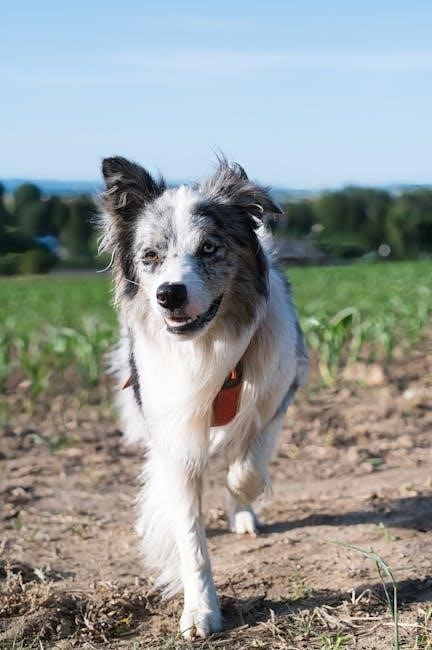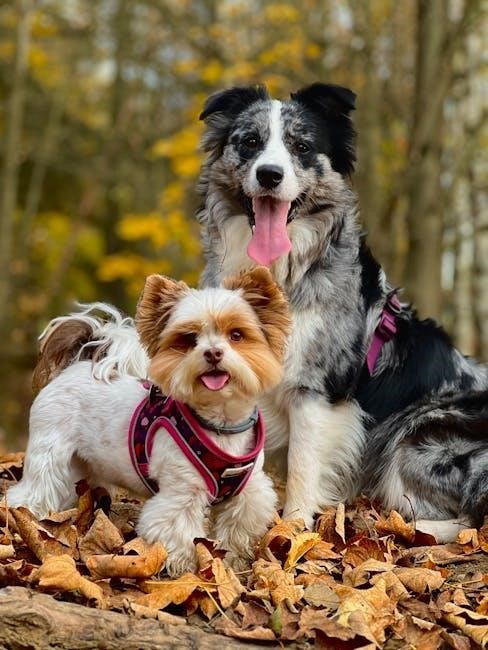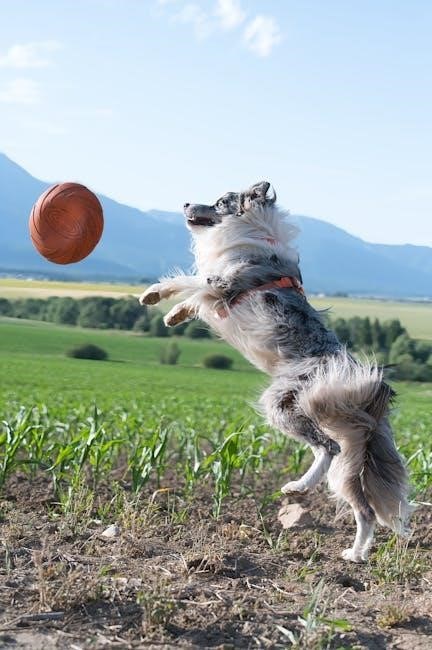toxic foods for dogs pdf
Understanding toxic foods for dogs is crucial for pet owners to ensure their furry friends’ safety. Certain human foods‚ like onions‚ chocolate‚ and avocado‚ can be harmful or even fatal. Recognizing these dangers helps prevent accidental poisoning and ensures a healthy‚ safe diet for dogs.
Importance of Awareness
Awareness of toxic foods for dogs is essential for pet owners to safeguard their pets’ health. Many common household foods‚ such as onions‚ garlic‚ and chocolate‚ can be highly toxic to dogs‚ leading to severe health issues or even death. According to recent studies‚ cases of food poisoning in dogs spike during holidays‚ emphasizing the need for vigilance. Understanding which foods are dangerous and how to respond quickly can prevent tragic outcomes. By staying informed‚ pet owners can avoid accidental ingestion of harmful substances and ensure their dogs thrive on a safe‚ balanced diet. Awareness also helps debunk myths‚ such as assuming all fruits or table scraps are safe‚ fostering a safer environment for pets.
Why Toxic Foods Matter
Toxic foods for dogs pose serious risks to their health and well-being. Even small amounts of certain substances‚ like chocolate or onions‚ can cause severe illness or death. According to studies‚ cases of food poisoning in dogs increase significantly during holidays‚ highlighting the need for vigilance. Some foods‚ such as grapes or avocado‚ contain compounds that can lead to organ failure or other life-threatening conditions. Understanding the dangers of toxic foods is vital for preventing accidental ingestion and ensuring pets receive only safe‚ nutritious options. Awareness empowers owners to make informed decisions‚ protecting their dogs from potential harm and fostering a healthier‚ safer lifestyle for their furry companions.
Brief Overview of the Issue
Toxic foods for dogs are a widespread and complex issue that affects canine health globally. Many common household foods‚ such as onions‚ garlic‚ chocolate‚ and avocado‚ contain compounds toxic to dogs. These substances can cause severe reactions‚ ranging from mild gastrointestinal distress to life-threatening organ failure. The problem is compounded by the fact that some seemingly harmless foods‚ like grapes or raisins‚ can lead to kidney failure in dogs. Pet owners often unknowingly expose their pets to these dangers‚ especially during holidays when food is more accessible. According to recent studies‚ cases of food poisoning in dogs spike during December‚ emphasizing the need for awareness and vigilance to protect pets from accidental ingestion of harmful substances.

Common Toxic Foods to Dogs
Toxic foods for dogs include onions‚ garlic‚ chocolate‚ avocado‚ grapes‚ and raisins. These foods contain harmful compounds that can cause severe reactions‚ organ damage‚ or even death if ingested.
Top Toxic Foods Every Owner Should Know
Several common household foods are highly toxic to dogs‚ and awareness is key to preventing accidental poisoning. Onions‚ garlic‚ and chives contain thiosulphate‚ which damages red blood cells. Chocolate includes theobromine‚ a stimulant that can harm the heart and nervous system. Grapes and raisins are notorious for causing kidney failure. Avocados contain persin‚ which can lead to vomiting and heart issues. Xylitol‚ found in sugar-free products‚ triggers severe hypoglycemia. Cooked bones splinter and can cause internal injuries. These foods are dangerous even in small amounts‚ making it crucial for owners to keep them out of reach. Always double-check human foods before sharing them with your dog.
Why These Foods Are Dangerous
Certain foods are dangerous to dogs due to their chemical composition and the way they interact with a dog’s metabolism. Onions and garlic contain thiosulphate‚ which can destroy red blood cells‚ leading to anemia. Chocolate has theobromine‚ a stimulant that can cause heart palpitations and seizures. Grapes and raisins contain compounds that can trigger kidney failure‚ even in small amounts. Avocado’s persin can cause vomiting and heart damage‚ while xylitol‚ found in sugar-free products‚ leads to rapid hypoglycemia and liver failure. These substances are processed differently in dogs‚ making them highly toxic despite being safe for humans. Understanding these risks is vital for protecting your pet’s health.
Debunking Common Myths
Many myths surround toxic foods for dogs‚ often leading to confusion among pet owners. One common myth is that small amounts of chocolate or onions are harmless‚ but even minimal ingestion can cause severe health issues. Another myth is that cooked bones are safe‚ when in fact‚ they can splinter and cause internal damage. Some believe all fruits are dangerous‚ but apples‚ bananas‚ and blueberries are safe in moderation. It’s important to separate fact from fiction‚ as misinformation can lead to accidental poisoning. Always rely on credible sources‚ like veterinarians or pet safety organizations‚ to ensure accurate guidance on toxic foods for dogs.
Alcohol and Beverages
Alcohol is highly toxic to dogs‚ causing vomiting‚ seizures‚ and respiratory failure. Beverages like beer‚ wine‚ and liquor contain ethanol‚ which can lead to severe health issues in dogs.
Dangers of Alcohol Consumption
Alcohol is a common household substance that poses significant risks to dogs. Even small amounts of alcohol can be dangerous‚ as dogs metabolize ethanol differently than humans. Consuming alcoholic beverages‚ such as beer‚ wine‚ or liquor‚ can lead to severe health issues‚ including vomiting‚ diarrhea‚ and central nervous system depression. In severe cases‚ alcohol ingestion can cause seizures‚ respiratory failure‚ and even death. The toxic effects of alcohol in dogs can develop rapidly‚ making prompt veterinary intervention critical. It is essential for pet owners to keep all alcoholic products out of reach‚ as even small amounts can prove fatal to dogs;
Specific Beverages to Avoid
Certain beverages pose significant risks to dogs due to their alcohol or other toxic ingredients. Beer‚ wine‚ and cocktails are dangerous because they contain ethanol‚ which can cause severe poisoning in dogs. Even small amounts can lead to vomiting‚ diarrhea‚ and central nervous system depression. Additionally‚ beverages like coffee and tea contain caffeine‚ which is also toxic to dogs and can cause hyperactivity‚ heart palpitations‚ and seizures. Other drinks‚ such as raw milk or untreated apple cider‚ may contain bacteria or alcohol from fermentation‚ further increasing the risk. It is crucial to keep all beverages out of reach and immediately seek veterinary care if a dog ingests any of these substances.
Surprising Sources of Alcohol
Beyond the obvious sources like beer and wine‚ alcohol can be found in unexpected places that pose risks to dogs. Fermented foods‚ such as bread dough or yogurt‚ can produce alcohol as they break down‚ leading to toxic levels if consumed. Even small amounts of ethanol in these foods can cause severe health issues in dogs. Additionally‚ some medications and mouthwashes contain alcohol‚ which can be hazardous if ingested. Dogs may also encounter alcohol in unusual sources like hand sanitizers or perfumes‚ highlighting the need for vigilance. Always check labels and keep such products far out of reach to prevent accidental poisoning and ensure your dog’s safety.

Fruits
Fruits can be both nutritious and dangerous for dogs. Grapes‚ raisins‚ and cherries are highly toxic‚ causing severe health issues‚ while apples and bananas are generally safe when prepared properly.
Dangerous Fruits for Dogs
Certain fruits pose significant risks to dogs due to their toxic properties. Grapes and raisins are particularly hazardous‚ as they can cause kidney failure in dogs‚ even in small amounts. Cherries‚ while not toxic in their fleshy part‚ contain pits that release cyanide‚ which is deadly. Avocados are also problematic‚ as their pits‚ skin‚ and leaves contain persin‚ a toxic compound that can cause vomiting and heart issues. Apples‚ though generally safe‚ become dangerous when seeds or cores are consumed‚ as they contain amygdalin‚ which releases cyanide. These fruits can lead to severe health complications‚ making it essential for owners to keep them out of reach.
Safe Fruits and How to Serve Them
While some fruits are toxic to dogs‚ others can be safely incorporated into their diet when prepared correctly. Apples‚ for instance‚ are safe as long as seeds and cores are removed to avoid cyanide exposure. Bananas are a nutritious‚ easily digestible treat and can be served in moderation. Blueberries are a great source of antioxidants and can be given as an occasional snack in small portions. Strawberries are also safe but should be hulled to remove stems and leaves. When serving fruits‚ ensure they are fresh‚ washed thoroughly to remove pesticides‚ and free from added sugars or creams. Always introduce new fruits gradually and in small amounts to monitor for any adverse reactions.
Preparation Tips for Safety
Proper preparation is key to ensuring fruits are safe for dogs. Always remove seeds‚ cores‚ stems‚ and peels‚ as these parts can be toxic or cause digestive issues. For example‚ apples should be cored to eliminate seeds containing cyanide. Wash fruits thoroughly to remove pesticides or bacteria. Avoid adding sugars‚ creams‚ or other toppings‚ as these can harm your dog. Cooking or steaming fruits like berries can make them easier to digest. Portion control is essential‚ as overfeeding can lead to weight gain or upset stomachs. Introduce new fruits gradually and monitor for signs of allergic reactions or discomfort. Consulting a veterinarian for portion sizes and suitability is highly recommended to ensure your dog’s dietary needs are met safely.

Dairy and Processed Foods
Dairy and processed foods can pose risks to dogs due to lactose intolerance and toxic additives. Cheese‚ processed meats‚ and baby food with onion powder are particularly harmful. Always consult a veterinarian for safe dietary options.
Lactose Intolerance in Dogs
Dogs often suffer from lactose intolerance due to limited lactase enzyme production‚ making dairy digestion difficult. Consuming milk or dairy products can lead to diarrhea‚ bloating‚ and stomach discomfort. While some dogs tolerate small amounts of plain yogurt or cheese‚ excessive dairy intake can cause severe gastrointestinal issues. Processed dairy products‚ such as cheese spreads or flavored yogurts‚ may contain additional harmful additives. Furthermore‚ baby food with onion powder is particularly dangerous‚ as onions are toxic to dogs. Pet owners should avoid feeding dairy-based products to prevent digestive distress and potential toxicity. Always consult a veterinarian for advice on safe‚ lactose-free dietary options for dogs with sensitivities.
Dangerous Dairy Products
Certain dairy products pose significant risks to dogs due to their toxic compounds or harmful additives. Cheese spreads‚ flavored yogurts‚ and ice cream often contain high amounts of sugar‚ fat‚ and artificial ingredients that can lead to gastrointestinal distress. Processed dairy items‚ such as cream cheeses or milkshakes‚ are particularly dangerous because they may include toxic substances like chocolate or caffeine. Additionally‚ some baby foods containing onion powder are highly toxic to dogs. These products can cause severe health issues‚ including vomiting‚ diarrhea‚ and even organ damage if consumed in large quantities. It’s essential for dog owners to avoid feeding these dairy-based items to prevent potential poisoning and ensure their pets’ safety.
Myths Surrounding Dairy
Several myths surround dairy products and their safety for dogs. One common belief is that all dairy is harmful‚ but this isn’t entirely true. While dogs are lactose intolerant‚ small amounts of plain‚ unflavored yogurt or cheese can be safe in moderation. Another myth is that milk is a nutritious treat for puppies‚ but it can lead to digestive issues due to lactose. Additionally‚ some pet owners mistakenly assume that all dairy products are toxic‚ ignoring that some‚ like lactose-free options‚ are safer. Understanding these myths helps owners make informed decisions about safely incorporating minimal dairy into their dog’s diet without risking health complications.

Spices and Seasonings
Certain spices and seasonings‚ like nutmeg and garlic‚ can be toxic to dogs‚ causing tremors‚ seizures‚ or digestive issues. Always avoid seasoning pet food with harmful additives.
Common Spices That Are Toxic
Certain spices commonly found in human food can be harmful to dogs. Nutmeg is particularly dangerous‚ as it can cause tremors‚ seizures‚ and central nervous system damage. Garlic and onions‚ part of the Allium family‚ contain compounds that can lead to gastrointestinal distress and even damage to a dog’s red blood cells. Salt in excessive amounts can cause electrolyte imbalances‚ potentially leading to seizures or organ failure. Cinnamon‚ while not toxic in small amounts‚ can irritate a dog’s mouth and digestive system if consumed in larger quantities. Always avoid seasoning your dog’s food with these spices to ensure their safety and health.
Understanding Their Harmful Effects
Certain spices and seasonings can have severe and even life-threatening effects on dogs. For instance‚ nutmeg contains a compound called myristicin‚ which can cause tremors‚ seizures‚ and central nervous system dysfunction. Similarly‚ garlic and onions belong to the Allium family and contain thiosulphate‚ which can damage a dog’s red blood cells‚ leading to anemia. These substances can also trigger gastrointestinal distress‚ vomiting‚ and diarrhea. The severity of symptoms often depends on the amount consumed and the size of the dog. Understanding these harmful effects is crucial for preventing accidental poisoning and ensuring your dog’s safety. Always consult a veterinarian if you suspect your dog has ingested any toxic substances.

Safe Alternatives for Pet Treats
For pet owners‚ offering safe and healthy treats is essential. Fresh fruits like apples‚ bananas‚ and blueberries are excellent choices‚ provided seeds and cores are removed; Vegetables such as carrots and green beans are also great options. Cooked sweet potatoes and pumpkin can aid digestion and serve as nutritious snacks. Always ensure fruits and vegetables are free from added sugars‚ salt‚ or spices. For homemade treats‚ use dog-safe ingredients like oats‚ peanut butter (without xylitol)‚ and honey. Baby food can be a safe option if it’s free from onion powder and other harmful additives. Always introduce new foods gradually and consult your veterinarian if unsure about a treat’s safety for your dog.

Cooked and Processed Foods
Cooked bones can splinter and cause internal damage‚ while processed foods often contain harmful additives and excessive salt‚ posing serious health risks to dogs.

Dangers of Cooked Bones
Cooked bones pose significant risks to dogs due to their brittle nature‚ which can cause splintering and lead to internal injuries. When ingested‚ these sharp fragments can puncture the digestive tract‚ resulting in severe pain‚ bleeding‚ or life-threatening infections. Unlike raw bones‚ which are more flexible‚ cooked bones become dry and brittle‚ increasing the likelihood of splintering. Additionally‚ cooked bones can obstruct the gastrointestinal tract if they become lodged‚ leading to blockages that may require surgical intervention. These risks make cooked bones extremely hazardous for dogs‚ emphasizing the importance of avoiding them altogether. Always opt for safer alternatives‚ such as raw‚ meaty bones‚ to satisfy your dog’s natural chewing instinct without the associated dangers.
Risks of Processed Foods
Processed foods pose significant risks to dogs due to their high preservative content‚ excessive sodium‚ and artificial additives. These ingredients can lead to long-term health issues‚ such as obesity‚ organ damage‚ and digestive disorders. Many processed foods contain fillers and by-products that provide little nutritional value while introducing harmful substances. Additionally‚ some processed foods may include toxins like xylitol‚ commonly found in sugar-free products‚ which can cause severe hypoglycemia or liver failure in dogs. The convenience of processed foods often comes at the cost of your dog’s health‚ making it essential to read labels carefully and opt for natural‚ whole-food alternatives. Always consult your veterinarian before introducing new foods to your dog’s diet.
Safe Homemade Food Options
Preparing homemade meals for your dog can be a healthy alternative to commercial foods‚ provided you use safe‚ non-toxic ingredients. Cooked lean meats like chicken‚ turkey‚ or fish (without bones or seasoning) are excellent protein sources. Steamed vegetables such as carrots‚ green beans‚ and sweet potatoes are also safe and nutritious. Fresh fruits like blueberries‚ strawberries‚ and bananas (without seeds or pits) can be added in moderation. Avoid adding oils‚ spices‚ or seasonings‚ as they may harm your dog. Always remove seeds‚ pits‚ and peels‚ as they can be toxic. Consult your veterinarian to ensure the diet is balanced and meets your dog’s nutritional needs. Homemade meals allow you to control ingredients‚ ensuring your dog’s safety and well-being.

Emergency Preparedness
Emergency preparedness is vital for pet owners to act quickly when dogs consume toxic foods. Recognizing symptoms like vomiting‚ lethargy‚ or seizures and knowing when to contact a veterinarian can save lives.
Recognizing Poisoning Symptoms
Recognizing poisoning symptoms in dogs is critical for timely intervention. Common signs include vomiting‚ lethargy‚ seizures‚ tremors‚ and drooling. In severe cases‚ dogs may experience diarrhea‚ abdominal pain‚ or difficulty breathing. Some toxins‚ like chocolate or grapes‚ can cause cardiac issues or kidney failure‚ leading to more severe symptoms. Metabolic acidosis and low blood sugar are also potential complications. Symptoms may appear within minutes or hours‚ depending on the toxin and amount consumed. If you suspect poisoning‚ act quickly and contact your veterinarian or a pet poison hotline immediately. Early recognition and treatment can significantly improve your dog’s prognosis and prevent life-threatening complications.
First Response Actions
If you suspect your dog has ingested a toxic food‚ stay calm and act quickly. Contact your veterinarian or a pet poison hotline immediately for guidance. Do not induce vomiting unless explicitly instructed by a professional. Keep your dog calm to prevent stress‚ which can worsen symptoms. Provide any relevant information‚ such as the type and amount of food consumed‚ to help assess the situation. Avoid administering activated charcoal or other treatments without professional advice. Time is critical—prompt action can significantly improve your dog’s chances of recovery. Always prioritize veterinary consultation to ensure the best outcome for your pet.
When to Contact a Veterinarian
If your dog shows signs of poisoning‚ such as vomiting‚ lethargy‚ or loss of appetite‚ contact a veterinarian immediately. Even if symptoms seem mild‚ toxic foods can cause severe internal damage; Seek urgent care if your dog ingests known toxic substances like chocolate‚ onions‚ or grapes. Delayed reactions can lead to life-threatening conditions‚ so early intervention is critical. If your dog experiences seizures‚ difficulty breathing‚ or collapses‚ it is an emergency. Always err on the side of caution—consulting a vet promptly can prevent long-term harm or save your dog’s life. Timely professional advice ensures the best possible outcome for your pet’s health and safety.

Safe and Healthy Alternatives
Provide your dog with safe‚ healthy options like carrots‚ green beans‚ and apples (without seeds). These alternatives offer nutritional benefits without the risks of toxic foods‚ ensuring a balanced diet.
Human Foods Safe for Dogs
While many human foods are toxic to dogs‚ some can be safely incorporated into their diet. Carrots‚ green beans‚ and apples (without seeds) are excellent healthy options. These vegetables and fruits provide essential vitamins and fiber without posing risks. Cooked chicken‚ turkey‚ and fish (without bones or seasoning) are also safe and offer lean protein. Blueberries‚ in moderation‚ serve as a nutritious treat rich in antioxidants. Always ensure foods are plain and free from additives like salt‚ sugar‚ or spices. Introducing these foods gradually can help prevent digestive issues. Remember‚ even safe foods should be given in moderation to avoid overfeeding. Always consult a veterinarian for personalized dietary advice tailored to your dog’s needs and health conditions.
Healthy Treat Options
Providing healthy‚ safe treats is essential for rewarding your dog without risking their health. Carrots‚ green beans‚ and sweet potato slices are excellent low-calorie options that support digestion. Apples (without seeds) and blueberries offer natural sweetness and antioxidants. Plain‚ unflavored yogurt can aid digestion‚ while small pieces of cooked chicken or turkey provide lean protein. Homemade treats‚ like peanut butter-filled KONG toys or pumpkin biscuits‚ are also great alternatives. Always avoid adding salt‚ sugar‚ or spices. These treats not only satisfy your dog’s cravings but also promote overall well-being. Remember‚ treats should make up less than 10% of their daily calorie intake to maintain a balanced diet. Consult your veterinarian for personalized recommendations based on your dog’s specific needs and health conditions.
Nutritional Benefits of Safe Foods
Safe foods for dogs offer numerous nutritional benefits that promote overall health and well-being. Sweet potatoes are rich in vitamins A and C‚ while green beans provide fiber and essential minerals. Blueberries are packed with antioxidants that support cognitive function and immune health. Carrots aid in maintaining healthy vision and dental hygiene. Lean proteins like cooked chicken or turkey support muscle growth and energy levels. These foods also contribute to a balanced diet‚ reducing the risk of deficiencies. Additionally‚ they can improve skin and coat health‚ support joint function‚ and provide mental stimulation through varied flavors and textures. Incorporating these safe options ensures your dog receives the nutrients they need to thrive.
